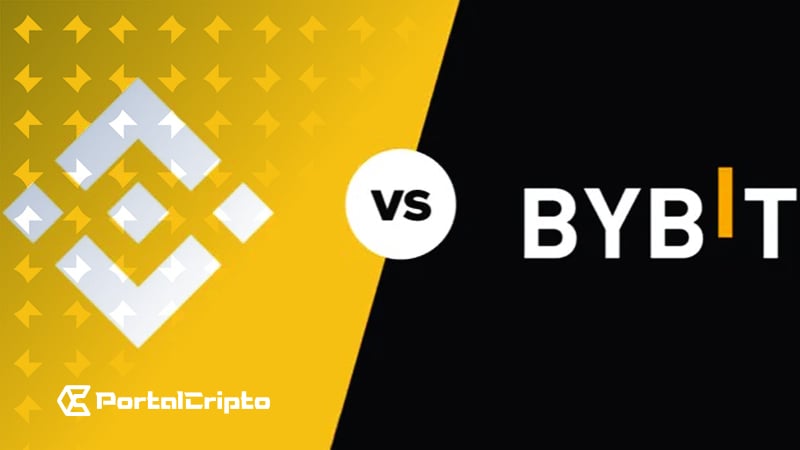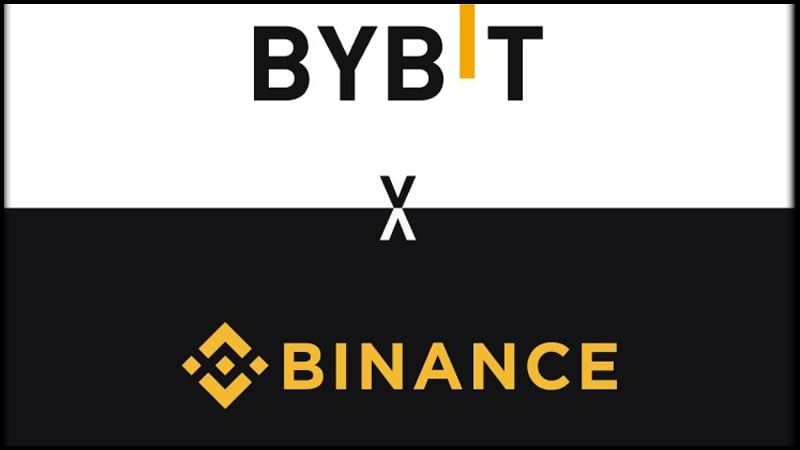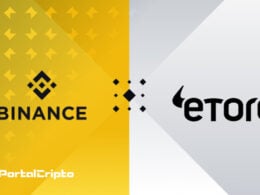A bybit has been expanding its market share at the expense of Binance, especially given the latter's regulatory clashes with the United States Department of Justice. Both platforms have a vast customer base, but Bybit stands out due to its impeccable regulatory track record and superior user experience. Recognized for its stability and advanced liquidity, Bybit is attractive to those who value security in their cryptocurrency exchange.
On the other hand, Binance, despite facing regulatory challenges, continues to provide an extensive range of services and maintains its influence around the world. With this, the analysis highlights Bybit as a rising alternative for investors looking for a safe and regulated platform. Binance, however, remains a comprehensive choice for a variety of crypto trading operations.
In this article, we will discuss:
Bybit vs Binance Overview
In the dynamic cryptocurrency exchange market, Bybit has emerged as a formidable competitor, taking advantage of the regulatory hurdles that Binance faces. This strategic move drove the expansion of its market share, establishing Bybit as a notable player, particularly in futures trading. For its part, Binance, despite navigating a sea of regulatory complexities, maintains its status as the largest cryptocurrency exchange in the world in terms of volume, serving a base of more than 150 million users with an extensive variety of services.
This scenario underlines the critical role of regulatory compliance in the cryptocurrency sector. Bybit's advancement signals its ability to quickly capitalize on market opportunities, reflecting agility and adaptability. On the other hand, Binance demonstrates the robustness and diversity of its services, continuing to attract a broad base of customers. The relationship between Bybit and Binance illustrates the competitive environment and constant evolution characteristic of the crypto market.
| Features | bybit | Binance |
|---|---|---|
| Headquarters | Singapore | Dubai, United Arab Emirates |
| Company type | Centralized Exchange | Centralized Exchange |
| Available assets | 930+ | 300+ |
| Regulation and Licensing | Level 1 Regulators | Level 1 Regulators |
| Price Plans | Spot Trading (0,1%), Futures Trading (0,02% to 0,05%) | Spot Trading (0,1%), Futures Trading (0,02% to 0,04%) |
| KYC verification required | Yes | Yes |
| Bet coins | 100+ Assets Supported for Staking | 60+ Assets Supported for Staking |
| Deposit Methods | Bank transfers, SEPA, credit cards, Google Pay, Apple Pay, E-Wallets and more. | Bank transfers, PayID, SEPA transfers, credit cards, e-wallets and more. |
| Available in the US | No | No |
| Total users | 15 million | More than 120 million |
Bybit vs Binance Futures
Bybit and Binance are references in the cryptocurrency futures market, attracting a considerable volume of operations. Bybit stands out for its user-friendly interface and a wide range of more than 180 futures contracts. One of its biggest attractions is the high availability of its servers, with an uptime of 99,99%, promoting a stable trading experience. Additional features such as Copy Trading and a VIP program broaden its appeal to a variety of trader profiles.
On the other hand, Binance Futures, integrated into the larger Binance ecosystem, features a variety of futures products, including USDⓈ-M and COIN-M futures, covering around 100 contracts. Despite the wide range of features, Bybit's approach, which prioritizes ease of use and reliability, positions it as an attractive alternative for those looking for a focused and effective platform.
Security and Regulation Bybit and Binance
In terms of regulation and security, crucial aspects when choosing cryptocurrency exchanges, both platforms are committed to meeting regulatory expectations. Seychelles-based Bybit is advancing regulatory compliance, evidenced by licenses obtained in Cyprus and efforts to acquire a license in Dubai. These initiatives reflect its commitment to adapting to international regulatory standards.
Binance, with its broad global presence, holds multiple licenses and registrations in different regions, including Europe, the Middle East and Asia-Pacific, aligning with local financial regulations and offering a full spectrum of services from exchange to cryptocurrency custody. This vast network of regulatory compliance highlights Binance's commitment to adhering to rigorous and established regulatory standards.
In summary, Bybit is on course to strengthen its regulatory position, while Binance already has a solid and extensive regulatory framework, which can provide an additional level of security and trust for users.
Rate Comparison
Understanding fee settings on cryptocurrency exchanges is crucial for traders, especially those who trade futures. Below is a comparative outline of the fee structures implemented by Bybit and Binance, two of the main platforms in the sector:
Fees implemented by Bybit:
- Maker Fee on Spot Trades: 0,10%
- Spot trading fee: 0,10%
- Maker fee on futures trades: 0,02%
- Taker fee on futures trades: 0,055%
Bybit is recognized for a straightforward and constant fee structure on spot trades. In futures, it proposes competitive rates for the creator, attracting investors who carry out frequent operations or who contribute to market liquidity.
Fees charged by Binance:
- Maker Fee on Spot Trades: 0,10%
- Spot trading fee: 0,10%
- Maker fee on futures trades: 0,02%
- Taker fee on futures trades: 0,04%
Binance has a spot trading fee match comparable to Bybit, but excels in futures trading with slightly lower taker fees. This can be attractive to traders who carry out operations that remove liquidity from the market more frequently.
Both platforms offer highly competitive rates, with nuances that adapt to different trading strategies and volumes. While Bybit offers a balanced fee structure between its spot and futures trading modes, Binance may be more attractive to traders active in the futures market due to its reduced fees for takers.
Other products and services
Bybit and Binance excel not only in their fundamental spot and futures cryptocurrency trading services, but also in a variety of additional products and functionalities:
Bybit:
- Bybit Wallet: Facilitates access to Web3 with a simplified interface.
- Mantle L2: Provides a layer 2 ecosystem for decentralized applications using the blockchain Mantle.
Automated Trading Tools: Offers solutions like copy trading and bots based on artificial intelligence. - Investment Opportunities: Includes services such as Bybit Earn and cryptocurrency loans.
- NFT Marketplace: A platform to explore and trade NFTs.
- Educational Resources: Provides a variety of educational materials for crypto traders.
Binance:
- Binance Academy: Provides an extensive educational repertoire on blockchain and cryptocurrencies.
- Binance Labs: Investment segment dedicated to supporting innovative Web3 initiatives.
- Binance Research: Offers in-depth analysis and perspectives on digital assets.
- BNB Chain: Represents one of the largest ecosystems of decentralized applications, second only to Ethereum.
- Binance NFT Marketplace: A vast collection of NFTs and related community activities.
While Bybit strives to offer advanced trading tools, diversified investment opportunities, and access to the emerging NFT market, Binance extends to provide educational content, support for innovative projects through venture capital, and a robust decentralized applications platform. Both platforms tailor their services to meet a wide range of user needs, reflecting their distinct strategies and customer bases.
Conclusion
In summary, when evaluating Bybit and Binance, it is clear that both exchanges satisfy different demands of traders in the dynamic environment of cryptocurrency exchanges. Bybit stands out for its accelerated growth in the futures market, providing an intuitive and user-centric platform while advancing in terms of regulatory compliance.
In turn, Binance has established itself as the largest cryptocurrency exchange by trading volume, encompassing a wide range of services and maintaining a solid global regulatory presence, although it has faced significant penalties in the US. The decision between Bybit's optimized and focused interface and Binance's extensive portfolio of services comes down to the individual preferences and specific needs of each trader.
FAQ
Does Bybit surpass Binance in quality?
Considering that Bybit ranks 11th among exchanges, while Binance has held the lead for years, the prevailing view is that Bybit does not outperform Binance.
Binance's primacy is due to its high-quality user interface, similar to Bybit, serving both amateur and professional traders and institutions, in addition to offering a wider range of markets and cryptoassets. However, a trader may prefer Bybit if they are looking for a community of more advanced traders, want to participate in trading competitions or are interested in the bonuses offered upon registration.
Is Bybit recommended for cryptocurrency trading?
Bybit's 10 million users attest to the platform's excellence as a prominent exchange. With an established and respected reputation in the crypto community, Bybit stands out for its robust and high-performance trading mechanism, being a reference in the cryptocurrency sector.
Is Binance a Right Choice for Cryptocurrency Trading?
Dominating the sector with a daily trading volume more than five times that of second place and with tens of millions of global users, Binance establishes itself as the most pre-eminent exchange in the crypto market. Its excellence is due to advanced security, collateral on client funds, vast selection of assets and tradeable markets/instruments, as well as an unrivaled offering of products and resources, while still maintaining competitively low fees.
Are the costs at Bybit high?
Bybit's fees are considered low compared to other exchanges, providing users with an affordable cost structure. Fees vary between 0% and 0,1%, adjusted according to trading volume, as detailed in the fees section on the Bybit website.











